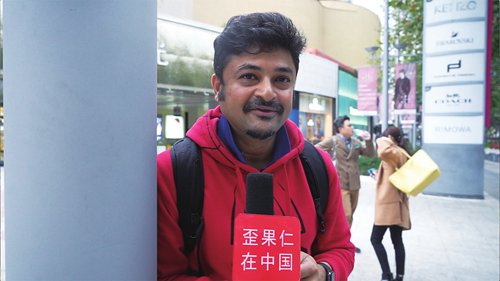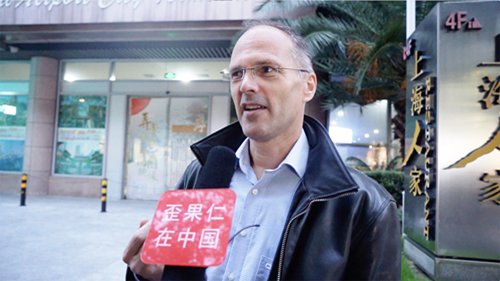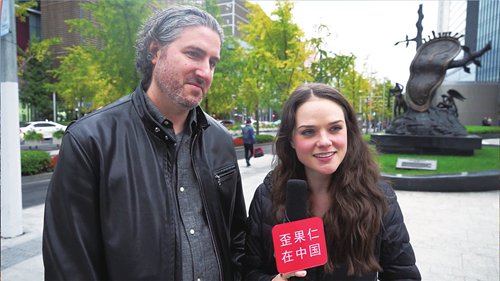METRO SHANGHAI / CITY PANORAMA
Foreigners in Shanghai discuss the topic of sperm donations
A sticky subject

Photo: VCG
While many Chinese couples are happy about the nation's loosened birth policies and are getting ready to have their second child, an equal proportion fail to conceive due to infertility. Statistics show that about 12 to 15 percent of couples of childbearing age in China cannot have babies, the Beijing News reported in October.
The topic of sperm donation is still considered a stigma to most Chinese people because any mention of "sperm" tends to remind them of sex or masturbation.
The low acceptance rate of sperm donor applicants who take tests for their sperm count, vitality and morphology also deter well-intentioned people who otherwise would want to donate.
Statistics from the Shanghai-based Fudan Human Sperm Bank show that, since the start of its trial operations in June, they have only received about 100 applicants in total - with less than 10 percent of the semen collected meeting the sperm bank's quality standards.
What is the situation in other countries? Is the topic of semen and sperm donations considered a taboo or stigma? The Global Times recently spoke with some foreigners in Shanghai about this sticky subject matter.
Many Chinese presume that people from other countries where assisted reproductive technologies have been developing longer than in China do not feel shy or awkward about the topic of sperm donations. However, it turned out that this is not always the case.
35-year-old Sebastian Kraus, CEO of a German company, has heard about sperm donations but does not know anyone who has donated their sperm in Germany. He thinks Germans are just as shy as the Chinese to talk about sperm and semen.
Likewise, 38-year-old Indian IT manager Vijay has no idea if there are any Indians donating their sperm. But his elder sister and his brother-in-law, who were unable to have their own child, adopted a child five years ago.
"In our poor country there are many orphans. So my sister adopted a child and they are now very happy. But I'm not sure about the matter of sperm donation in India," Vijay told the Global Times.
According to Vijay, most Indians would prefer to adopt a child instead than discuss donating or receiving sperm. "We would be too shy to talk about sperm donation," Vijay said.
Actress-cum-writer Melissa Dougherty from the US, however, said it's very common for Americans to donate their sperm. Dougherty knows many couples who do IVF (in-vitro fertilization). According to Dougherty, single women can choose sperm based on whether the man went to college, his hair color, etc.

Photo: VCG
Passing on genes
A 51-year-old American educator in Shanghai, Lori Han, thinks it is very common to go to fertilization clinics back in the US. Han has a friend whose family suffered from infertility and had to use a surrogate mother in order to have a family of their own. The father was able to donate his sperm and they were successful in conceiving a child.
"He donated his sperm so they could have a surrogate mother. Someone else carried his sperm so that their biological child was born to a surrogate mother," Han said.
Han does not think Americans feel shy about talking about sperm. "Now more and more people are open about their struggles. And I just read that Michelle Obama said that she had to have IVF treatment to give birth to her daughters Sasha and Malia," Han said.
However, director Brian Roff from the US thinks some Americans feel embarrassed about the topic and he doesn't know anyone who has donated sperm. Martin Lunt, 54, a company manager from Germany, thinks sperm donations are not very common in his country and he doesn't know anybody who has donated sperm.
But according to Lunt, Germans won't feel too shy to talk about sperm donation. "It's not very common, but it's possible to talk about that in public," Lunt said, explaining that the reason why Germans usually don't donate sperm is that people usually try to use their own genes to pass on to their next generation.
"So you don't want to use something else, different genetic information. You want to bring in your own genetic information in the next generation," Lunt said.
Under pressure
When told that only less than 10 percent of all sperm donation applicants in China can pass the sperm count and quality tests, most of our foreign interviewees were not surprised.
"It may be because of the particularly heavy pressures of life and work in Shanghai," Vijay said, adding that there is also a similar problem in India. Many young Indians cannot conceive children naturally, so they have to go to hospital or adopt children. "Such cases are increasing in big cities, but smaller cities where pressure is not as huge don't have such problems," Vijay said.
"I don't know the exact number, but in Germany I think you have to take health tests too if you want to be qualified to make donations," Kraus said. Han thinks that it is important to screen sperm donors. "You want to ensure that when someone needs the service, they can trust that the process has been thoroughly controlled and is reliable and trustworthy," Han said.
Lunt agrees. "It does make sense to check if you have sperm that are not usable. But I don't know what exactly you are checking. Do you have to fulfill certain requirements or certain criteria? But of course you have to have sperms which are possible or which can be used for reproduction," Lunt said.
According to Lunt, environmental quality, diseases and hormones in the food chain all could cause men to not produce sperm that can be used for reproduction. "But it's not the case at the moment in Germany. I've not heard so much about that in Europe," Lunt exclaimed.
What if...?
"I don't know enough about how they screen for sperm, but seems like a good idea to be selective," Dougherty said. "I know if women donate eggs, the better the school they went to means that more expensive their eggs."
"In our country, women are selective if the man has gone to a really elite college or is tall. I think these women are picky, so it makes sense," Roff said.
So if our interviewees had the problem of infertility, would they use a donor's sperm to conceive? The answers differed.
"Luckily I don't have this problem, but if I did, I would choose this opportunity if I wanted to have kids. Why not?" Kraus said.
Vijay and his Chinese wife have already discussed this option. "If we cannot conceive children, we will first receive treatment at a hospital. If we still cannot have children after treatment, we will consider adopting. But we have never thought of using donor's sperm," Vijay said.
Han thinks using a donor's sperm is increasing all the time because people are eager to have a family of their own. People are also willing to help make other families happy and it is becoming more common to donate sperm because people trust the science behind it.
"I already have four children, so I am really sure I don't have this problem," Lunt said, laughing.
At one point, Han thought she might be infertile. "My husband was very understanding, and we were considering getting some treatment. But then my health improved and I was able to conceive biological children."
"But I think if we were in the situation where we could provide support to other families, it would be a very positive thing to do," Han said.

Lori Han Photo: Lu Ting/GT

Sebastian Kraus Photo: Lu Ting/GT

Vijay Photo: Lu Ting/GT

Martin Lunt Photo: Lu Ting/GT

Brian Roff (left) and Melissa Dougherty Photo: Lu Ting/GT
